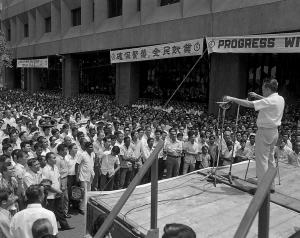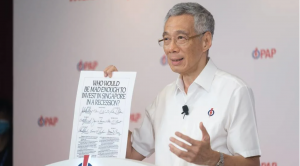“Every election, rain or shine, the PAP holds a lunchtime rally at Fullerton. It is the highlight of the campaign. Pandemic or no, we will again hold a Fullerton rally this time, but it will be online,” wrote Prime Minister Lee Hsien Loong in a Facebook post.
With physical rallies out the window thanks to the Covid-19 pandemic, it certainly does not translate to the end of the iconic lunchtime rallies, also known as the “Fullerton rally”. Founding Prime Minister Lee Kuan Yew spoke at the first-ever lunchtime rally in 1959, held at Fullerton Square, as a way to reach out directly to the English-educated office crowd. Since 1996, the rally in Fullerton has been held at the UOB Plaza promenade.


Known for attracting huge crowds with people standing shoulder-to-shoulder, sometimes even in the rain, spectators used to look in awe as Singapore’s future leaders made long speeches. However, this General Election, the lunchtime rally pales in comparison.
Remembering Lee Kuan Yew’s Legacy
Known for his transformational leadership and strong oratory skills, Lee Kuan Yew’s strong inspiring personality attracted the support and devotion of many in the early years of Singapore. He possessed one strong trait that exists in many great leaders: Charisma.
He managed to inspire and motivate people, gaining a strong following. His communication skills were impeccable in asserting for change and bringing people together. His charismatic traits were pivotal in uniting Singaporeans during the 1960s when she was going through a tough period. People trusted him and the strict policies brought by him as Singaporeans believed it was for the development of the country.
The audience remained hushed and silent as they listened intently to his words. Applause and cheers ensued as he finished his speech.
Mr Lee indeed set the bar high for future rallies.
The significance of lunchtime rallies has historically been heated. Mr Lee delivered one of his most iconic speeches in 1980, exposing what happened behind closed doors in the dispute between Singapore Airlines (SIA) and the pilot union (SIAPA).
Three pilots and a flight engineer had refused to work beyond the minimum hours stipulated in their contracts and were summoned to his office, where he gave them an ultimatum: Work, or the airline would be grounded.
“Let there be no mistake about this. Whoever governs Singapore must have that iron in him, or give it up,” said Lee. “This is not a game of cards. This is your life and mine. I spent a whole lifetime building this and as long as I am in charge, no one is going to knock it down.”
Where today politicians use long thought out Facebook posts to throw shade at each other, feuds and potshots were previously publicly fired at large crowds during lunchtime rallies between PAP and opposition parties.
The continued battle between SDP and PAP: 2011 and 2015 General Election lunchtime rally
In 2011, Prime Minister Lee Hsien Loong said “I’m sorry” over some of the mistakes that the government made such as allowing the escape of terrorist Mas Selamat and the Orchard Road floods.
“We’re sorry we didn’t get it exactly right, but I hope you will understand and bear with us because we are trying our best to fix the problems,” he said.
The Singapore Democratic Party (SDP) in response to this not only did not accept the PM’s apology but Dr James Gomez also called PM Lee out for having “no confidence” and using the “last salvo of apologies and sympathy appeal”.
In a bold statement directed to PM Lee he said, “You do not have the standing of a prime minister going into an electoral battle.”

Similarly, 2015 saw the chief of SDP Chee Soon Juan returning to the political arena after being declared bankrupt from the last two elections. Referring to the lawsuits, “they say we have damaged its reputation… I say, reputation is temporary, character is permanent.”
From here we can see how parties engage in politics. Where in the past, people would gather to witness this performance, now, people are overloaded with information and statements in the form of press releases and Facebook posts. These have taken over long speeches and passionate arguments.
2020 e-General Election: Lunchtime rallies have lost its significance
These days the closest thing to lunch time rally rivalry are the political debate broadcasts on live television. Nevertheless something is still missing.
Even though technology has its benefits such as increasing viewership, broadening creativity in campaigns, and expanding the ways in which parties can deploy publicity, there is just something about live rallies that moulds and augments the General Elections atmosphere, building exciting tensions leading up to Polling Day.
Lunchtime rallies specifically hold special significance in Singapore because many iconic speeches have ensued. Even for voters, the gnarly experiences like waiting in the sun, squeezing to get a good view and even fringe entertainment such as controversial posters done up by Singaporeans, play into the General Elections hype.

What this General Elections lack, or even what PM Lee lacks in comparison to Lee Kuan Yew is the personal touch that we, as humans, love to experience. To see the passion, zeal and fervour live in-person exuding from politicians can never beat on-screen viewing. PM Lee thus falls behind on this compared to his predecessor with his more modest and tame approach when making speeches, and it is even harder to touch audiences through a screen.
While it is understandable that crowds are not allowed to gather, PM Lee’s lunchtime rally on July 6 arguably lacked the atmosphere, audience intensity, and engagement and thus took away the spark of lunchtime rallies. It is hard to distinguish the uniqueness of this lunchtime rally to any other rallies that have been posted online this General Election.

With the pandemic, it will thus be harder to move and sway voters, and politicians have to be able to find ways to counter this. Hence, even though technology may have widened the scope of the audience, live lunchtime rallies can never be replaced. -/TISG

